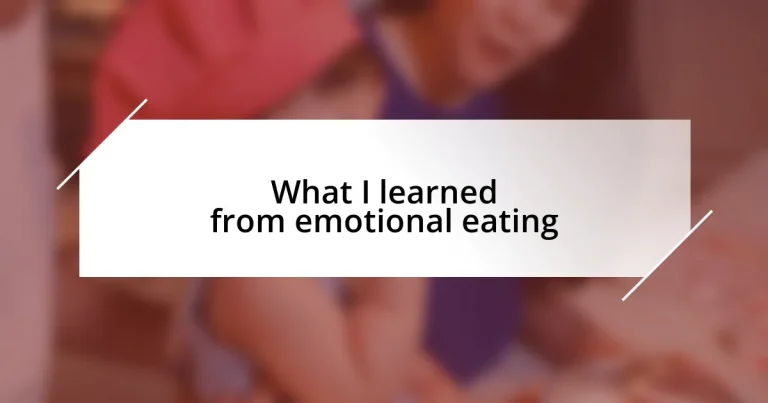Key takeaways:
- Emotional eating often serves as a coping mechanism during stress, leading to the need for self-reflection and understanding emotional triggers.
- Developing mindful eating habits, such as pausing before eating and journaling, can enhance awareness of hunger cues and improve emotional connections with food.
- Creating healthy coping strategies, like physical activities and alternative rewards, can replace food reliance with more nurturing options.
- Seeking professional support from therapists or support groups can provide guidance and community, helping individuals manage emotional eating more effectively.
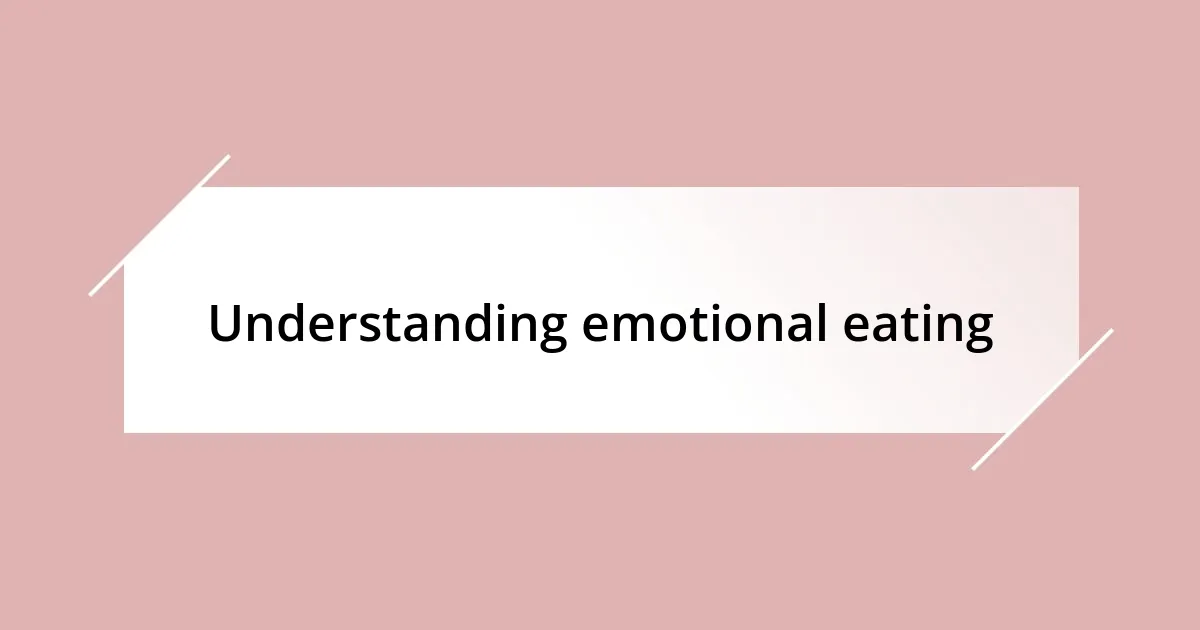
Understanding emotional eating
Emotional eating can often feel like an escape route during stressful or overwhelming times. I remember a particular evening when a heavy workload led me straight to the kitchen. It was as if the warm cookies were comforting me in ways nothing else could, but later, I felt a mix of guilt and confusion—was that really the answer to my stress?
Recognizing emotional eating is key to understanding our behaviors. Do we reach for snacks when we’re anxious, bored, or even happy? For me, food often became intertwined with celebration and solace, illustrating that emotional triggers can take many forms and sometimes disguise themselves as benign habits.
It’s fascinating how our emotions can dictate our food choices. I often reflect on how a simple card from a friend used to make me crave ice cream, a tasty reward for feeling loved. The connection between feelings and hunger can be deeply rooted, leaving me pondering: how many of us have turned to food for comfort instead of truly addressing our emotions?
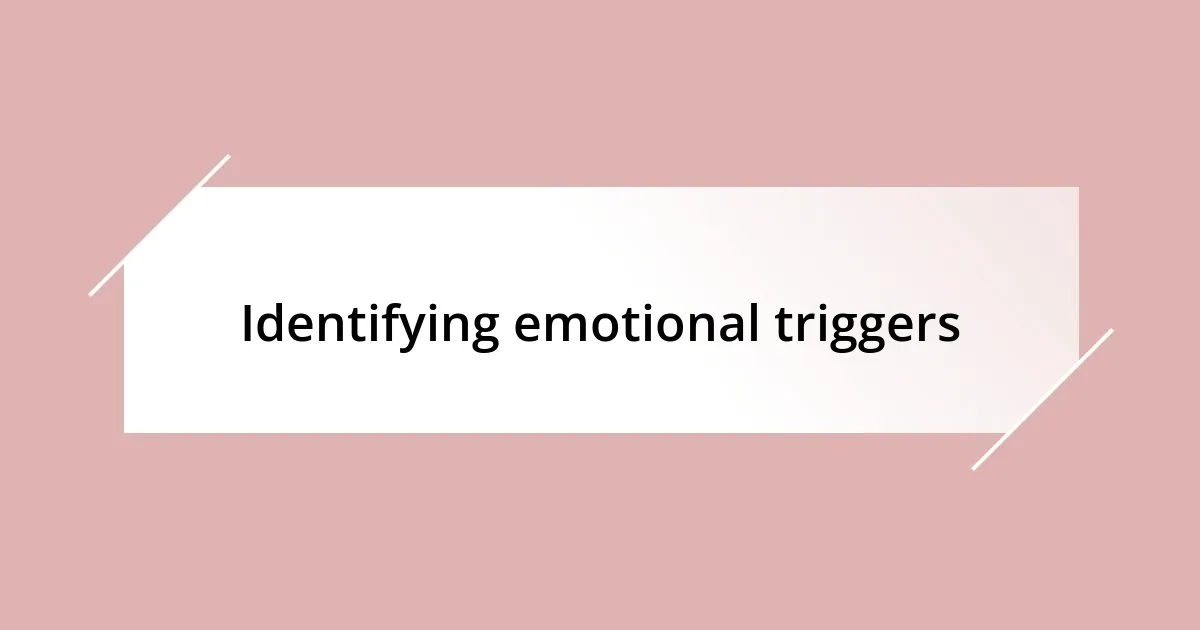
Identifying emotional triggers
Identifying emotional triggers is a vital step in understanding why we lean on food during certain moments. For instance, I noticed that after a tough day at work, I would raid the pantry. It wasn’t just hunger; it was a subconscious search for comfort that I didn’t know I was craving.
To help pinpoint these triggers, consider reflecting on situations where you reach for food. Here are some common emotional triggers to look out for:
- Stressful days that leave you feeling overwhelmed
- Celebrations or moments of joy that prompt a desire to indulge
- Feelings of loneliness or sadness that drive you to seek comfort in food
- Boredom that leads you to mindlessly snack while scrolling through your phone
Recognizing these patterns can be enlightening and empower you to make healthier choices in the future.
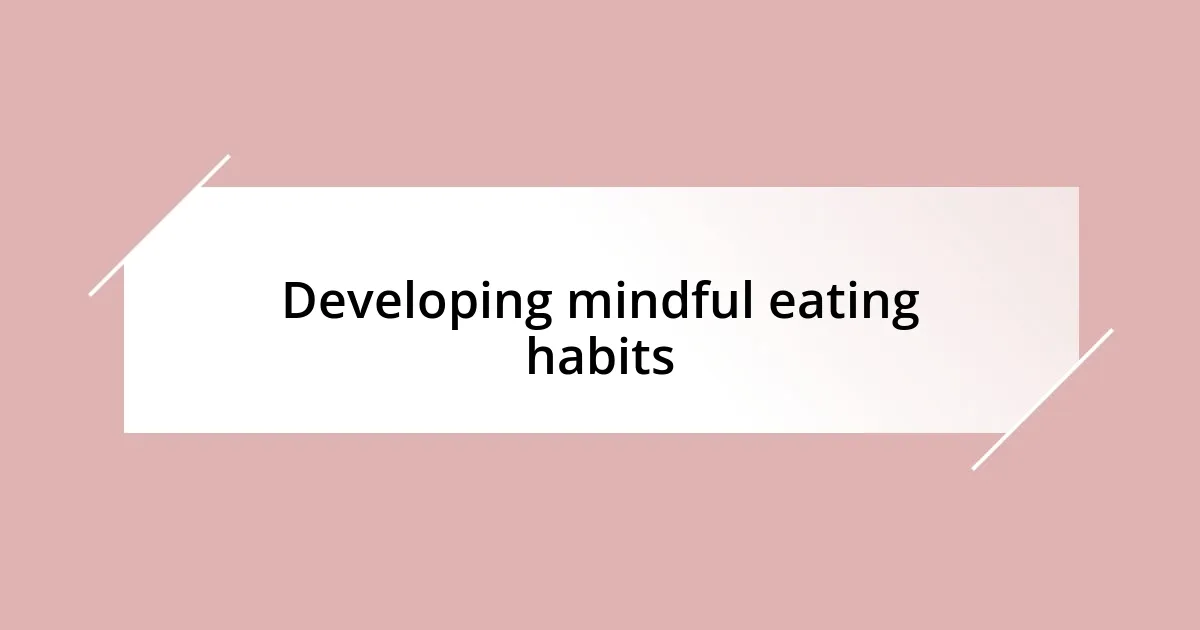
Developing mindful eating habits
Developing mindful eating habits can completely transform our relationship with food. I’ve found that taking a moment to pause before eating makes a significant difference. It’s about being aware of what I’m feeling and whether I’m genuinely hungry or just seeking comfort. For example, during a particularly stressful week, I decided to savor my meals instead of rushing through them. I lit a candle, put on some calming music, and focused on the flavors of each bite. That simple act turned a hectic dinner into a delightful experience.
In my journey towards mindful eating, journaling has become a game-changer. Recording my meals and emotions allows me to see the patterns in my eating habits. I used to think a “bad day” justified reaching for chips and salsa, but writing it down made me reconsider whether food was the real solution. Sometimes, I found I just needed to go for a walk or talk to a friend instead. This practice not only enhanced my awareness but also encouraged me to choose healthier alternatives.
Throughout my journey, I’ve realized that cultivating mindfulness during meals doesn’t have to be complicated. Taking a few deep breaths before eating or setting specific times for meals can help. I remember the first time I tried eating without distractions—I was amazed at how much flavor I had been missing! This shift in focus allowed me to enjoy my food fully and even led to decreased cravings. Embracing this approach has been deeply fulfilling, and I encourage you to experiment with it just as I have.
| Aspect | Mindless Eating | Mindful Eating |
|---|---|---|
| Focus | Distractions are common, often leading to overeating. | Conscious attention to food and feelings, leading to satisfaction. |
| Awareness | Little to no awareness of hunger cues; eating is automatic. | Heightened awareness of hunger and emotional triggers. |
| Connection | Food is consumed without emotional connection, leading to guilt. | A deeper connection to both food and emotions fosters healthy choices. |
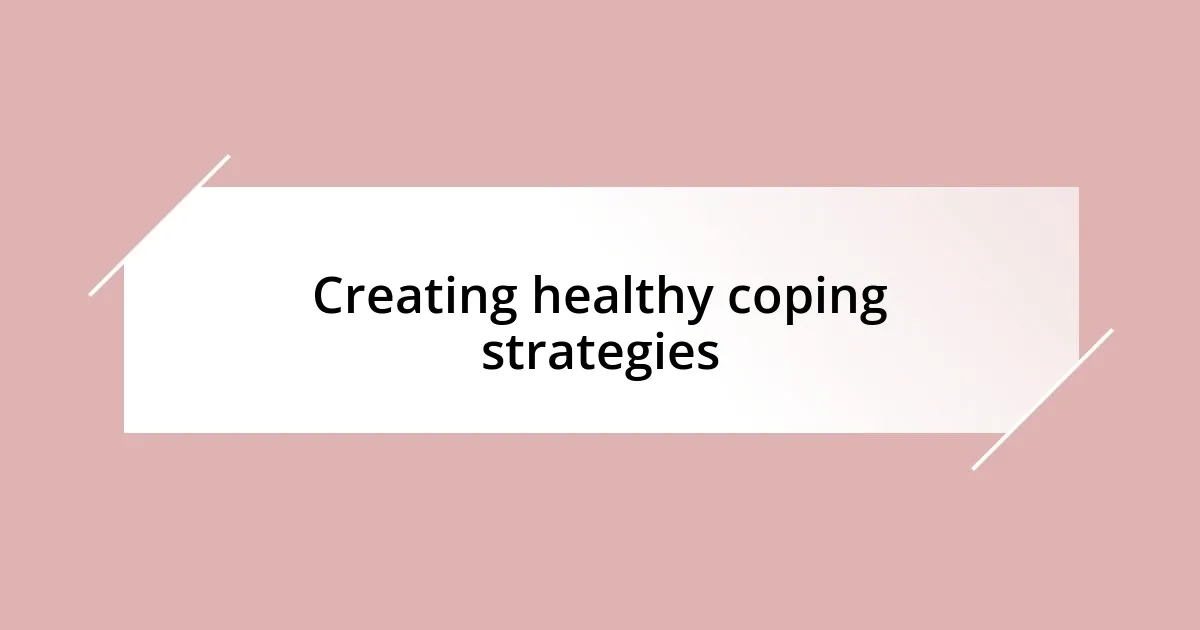
Creating healthy coping strategies
When creating healthy coping strategies, I’ve learned the importance of finding alternatives that genuinely nurture my emotional needs. One afternoon, feeling heavy-hearted, I reached for the cookie jar but paused to ask myself: What do I really need right now? As I pondered, I decided to take a walk in the sun instead. That simple choice not only lifted my mood but also helped me realize that physical activity could be a powerful way to cope with negative feelings.
Another strategy that has proven invaluable is replacing my food-related rewards with other enjoyable activities. I used to treat myself to a slice of cake after a long work week, but I found that activities like curling up with a good book or catching up with a friend brought me just as much joy—and often more meaning. Shifting this perspective made me reflect on how often I relied on food to celebrate or soothe myself. Have you tried seeking out alternative rewards? You might be surprised at the richness of experiences waiting for you outside of the kitchen.
Lastly, I can’t recommend enough the practice of deep breathing or short meditation when I feel the itch to snack without hunger. On days when stress creeps in, just pausing to take a few deep breaths helps me reconnect with my emotions. I often find that those moments of stillness allow me to assess my feelings more clearly. It’s not about denying myself pleasure but rather about understanding what I truly seek in those moments. What do you think about giving it a try the next time you feel compelled to eat? You may discover some enlightening insights along the way.
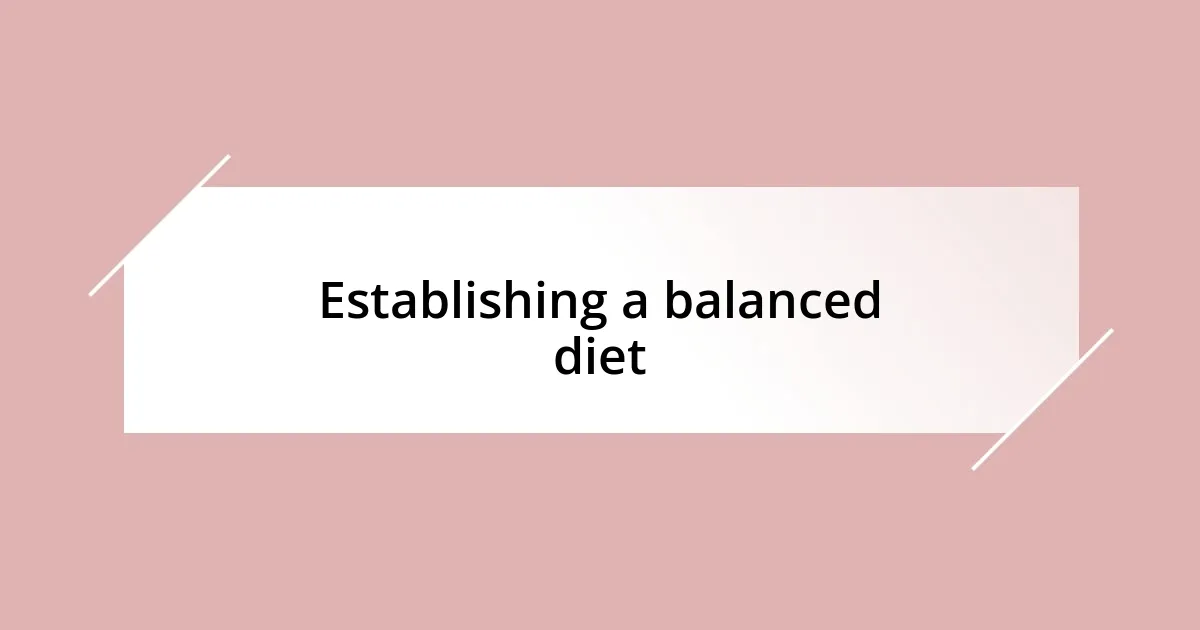
Establishing a balanced diet
Establishing a balanced diet has been one of the most liberating changes I’ve made. I remember a time when my meals were dictated by convenience rather than nutrition. When I finally took the plunge to plan my meals for the week, I found it immensely satisfying to see fresh fruits, vegetables, and whole grains on my plate. It’s amazing how simply preparing a colorful salad or a hearty stir-fry can elevate my mood and keep my energy levels stable throughout the day.
One of the best insights I gained from this journey is the power of variety. For instance, I used to stick to the same few meals weekly, which made eating feel monotonous. But when I began exploring different cuisines and seasonal ingredients, my meals became an adventure! Have you ever tried incorporating spices you’ve never used before? I’ll never forget the first time I added turmeric to my rice—it changed not just the flavor but also how I felt about my meals. It turned cooking into a creative outlet rather than a chore.
In terms of balance, I’ve learned to embrace moderation, which can be a little trickier than it sounds. There was a time when I felt guilty about enjoying dessert. However, I soon realized that allowing myself an occasional treat didn’t sabotage my health goals—it actually made me more satisfied overall. Now, I approach sweets with a different mindset: I savor a small piece of dark chocolate on a tough day, and it feels rewarding instead of indulgent. How do you view balance in your diet? Finding that sweet spot between indulgence and nutrition is key, as I’ve come to appreciate in my own experience.
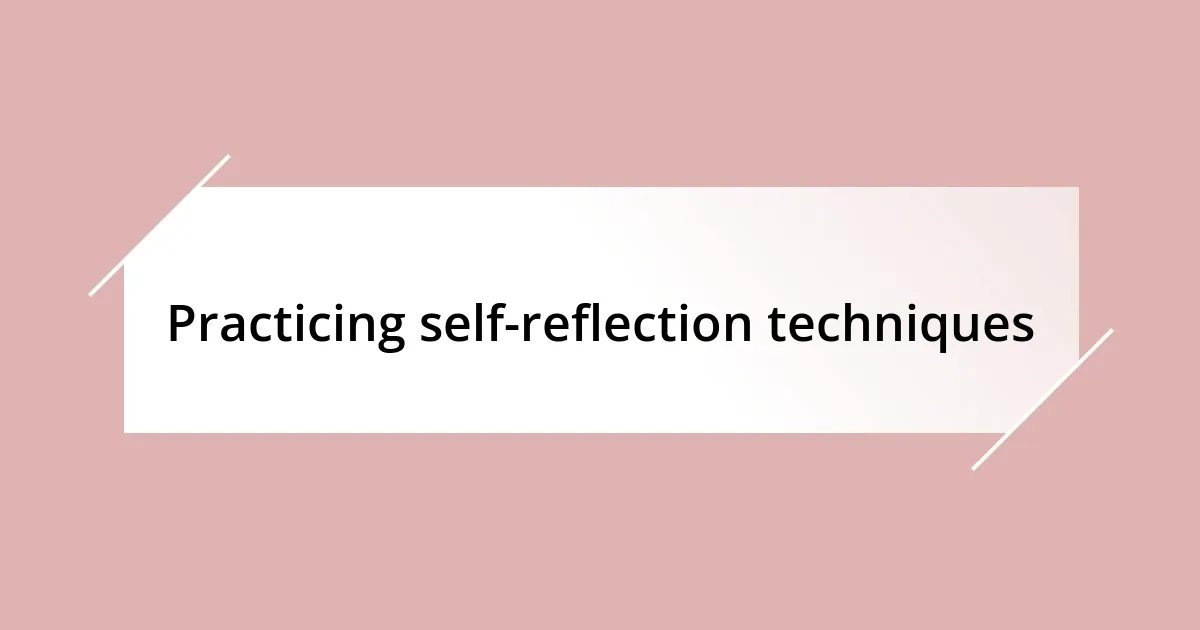
Practicing self-reflection techniques
Practicing self-reflection techniques has been a game changer in my journey with emotional eating. For instance, after a particularly stressful week, I found myself mindlessly munching on snacks while binge-watching my favorite show. It hit me that I wasn’t even truly enjoying the food. Sometimes, I ask myself: what am I really feeling in this moment? That question often leads me to uncover feelings I hadn’t acknowledged, like boredom or loneliness, allowing me to address them in healthier ways.
Journaling has also become an invaluable tool for me. I started writing down not only what I ate but also the emotions I was experiencing at the time. One evening, I wrote about how a disagreement with a friend led me straight to the refrigerator. Looking back at that entry months later made me realize how important it is to express my feelings constructively instead of turning to food. Have you considered tracking your emotions alongside your eating habits? It could reveal some enlightening connections.
Moreover, I’ve learned the value of meditation and mindfulness in my self-reflection practice. On days when I feel overwhelmed, sitting quietly and focusing on my breath helps ground me. One time, after just five minutes of mindful breathing, I became aware that what I craved wasn’t food, but rather connection—I picked up the phone to call a loved one instead. This shift made me realize that nurturing my emotional well-being could be as simple as reaching out for support. How does taking a moment to reflect resonate with you? It’s truly fascinating how slowing down can unveil true needs beneath the surface.
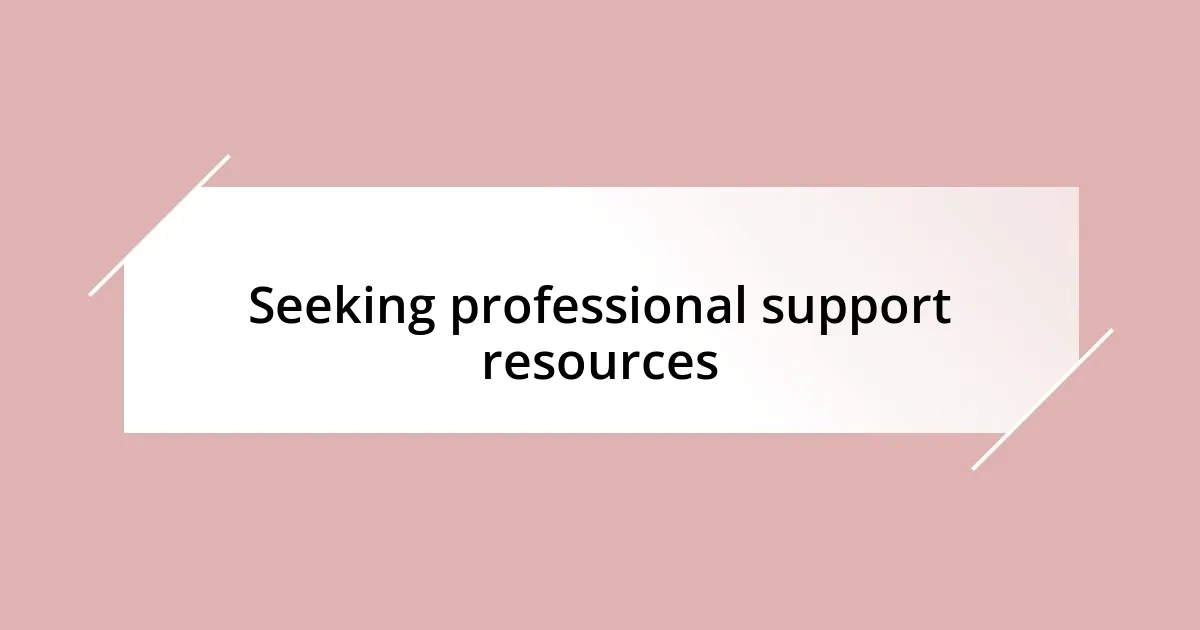
Seeking professional support resources
Seeking professional support can be a crucial step in managing emotional eating. I recall the first time I reached out for help—it felt daunting, but the relief I experienced was immediate. Finding a therapist who truly understood my struggles with food and emotion made the process less intimidating. Have you ever thought about how supportive it can feel to talk to someone who is trained to listen and guide? It can truly transform the way you view your relationship with food.
In my journey, I discovered that support groups can be incredibly helpful too. There’s something powerful about sharing experiences with others who are facing similar challenges. I remember attending a group session where a fellow member openly shared her story of overcoming a food binge after a tough day at work. Hearing her vulnerability made me feel less alone and more accountable in my own journey. Have you ever considered joining a group? It might provide not just support but also a sense of community.
Additionally, working with a dietitian trained in emotional eating opened my eyes to the importance of nourishing my body while addressing my emotional needs. I learned practical strategies, like mindful eating, which helped me slow down and really savor each bite. I often encourage others to seek this kind of specialized support. After all, isn’t it better to understand why we eat the way we do rather than just focusing on the food itself?












